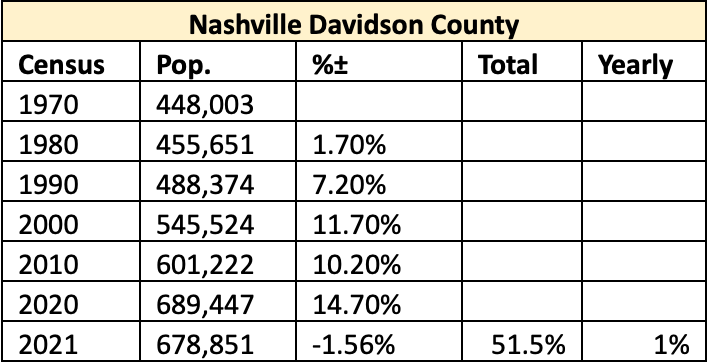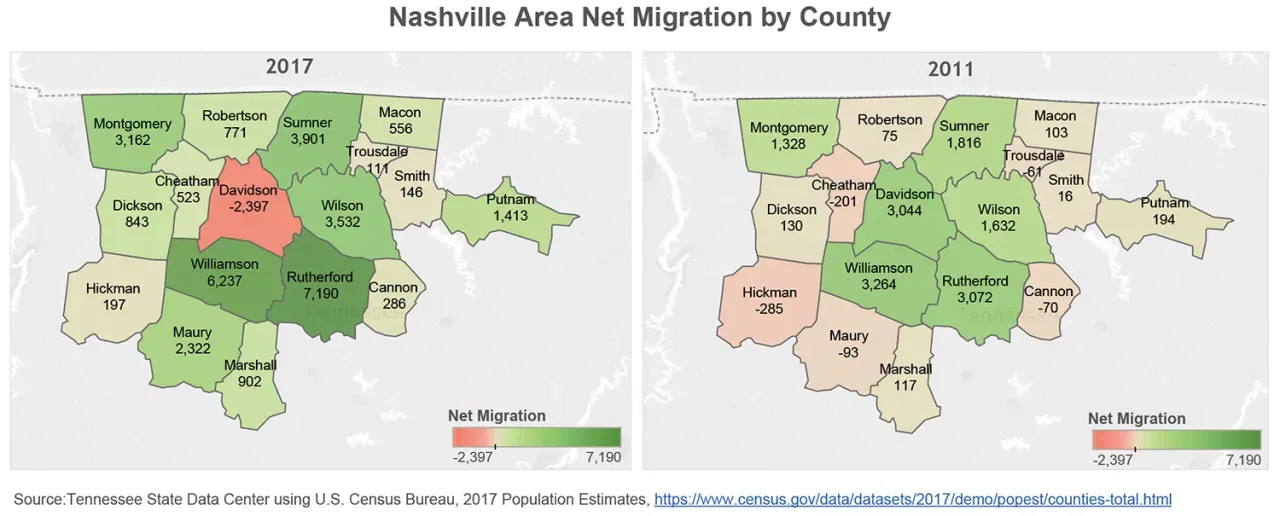
One Hundred People a Day
One hundred people a day, they used to say. One hundred per day to the MSA.
The story of Nashville’s growth has been touted far and wide across news media for at least a decade. Now, due to high rents, home prices, and interest rates, it seems moving to Music City is going out of style. But what if I told you that all of this was a mirage? What If I were able to show you that the city of Nashville, Tennessee’s “growth” or lack thereof is the result of just blatant obfuscation, a sleight of hand, a heaping pile of good ol’ fashioned bullshit?
First, we gotta go back to the beginning of this con, back to the 1950s. The actual city of Nashville was very small. Essentially, everything in or around the I-440 loop and East Nashville across the Cumberland river was it, while the outer areas of Davidson County were their own autonomous small towns (Antioch, Forest Hills, Donelson, Joelton, etc.) which met every so often to discuss county-wide affairs.
The post-WWII boom would largely benefit semi-rural suburban areas of the county instead of, as my granny used to say, “that hobo-infested den of sin downtown.” Sounds familiar, right? Most people only went to Nashville to go shopping on Church Street or to bring in some sort of agricultural commodity to sell for distribution by rail or river barge.
Well, that arrangement couldn’t just stand. Not if any government bureaucrat had anything to say about it. The two key players were Nashville Mayor Ben West and the future mayor Beverly Briley, a lowly county judge at the time.
I could spin a long tale for you about smoky backroom deals and dynamic scenes of different factions protesting in the streets touting platitudes of a newer brighter tomorrow, but I think Metro’s own website tells the story much better:
In 1958, the voters of Nashville and Davidson County rejected a charter to consolidate the city and county into one metropolitan unit of government by a referendum, in spite of the fact that the charter was supported by County Judge Beverly Briley and Nashville Mayor Ben West as well as both Nashville newspapers. Since the metropolitan government had failed, the city of Nashville immediately implemented alternative plans to improve its tax base. It began to annex commercial and suburban residential property outside the city limits and created a $10.00 wheel tax on all cars regularly using the city streets. This wheel tax, known as “the green sticker tax” outraged suburban residents in both the newly annexed areas and the remainder of Davidson County alike because it applied to all county residents who worked in the city. The annexation plan added 82,000 residents to the population of the city of Nashville. Other neighborhoods adjoining the city, but not inside Nashville’s city limits worried that their neighborhood could be annexed as well. Although the residents of the county wanted some city services such as a sewer system and fire protection, they feared that their taxes would increase without the city providing these additional services.
Yes, you did read that right. According to Metro’s own account, the force-fed consolidation plan was rejected by voters inside and outside Nashville’s city limits. You would think after such a resounding no vote that pro-Metro government leaders would get the message and leave the people of Davidson County alone to form their own decentralized, unique local communities– where all the women are strong, all the men are good-looking, and all the children are above-average.
Instead, just like every liberal-ass politician in this country does, they set out to accomplish the goal of squeezing out more tax money and overriding the will of the people (and you thought Metro Nashville only recently started not giving a crap about what citizens think).
Now back to how we got here:
Led by County Judge Beverly Briley and The Tennessean, supporters of the new charter launched a massive political campaign for passage. Mayor Ben West and the Nashville Banner no longer supported consolidation since the city had attempted to achieve a similar goal by annexation; they led the opposition. The African-American community of the city was divided over the long-term benefits of consolidation for African Americans since they had steadily gained political power in the city since World War II. In spite of their reservations, key African-American leaders such as Z. Alexander Looby and Avon Williams endorsed the new charter. On June 28, 1962, the voters of the city and the county voted in favor of the creation of Metropolitan government. Beverly Briley was elected the first mayor in November and Metropolitan government was implemented on April 1, 1963 with the swearing in of Mayor Briley & the newly elected Metropolitan Council. Nashville became the national pioneer in Metropolitan organization. Although other cities had partial consolidation, Nashville was the first city in the country to achieve true consolidation. Today, there are some fourteen consolidated governments in the United States out of over 3100 county units. Each successful consolidation has used the 1962 Nashville charter as a model.
So after all that hogwash, we now had the Metropolitan Government of Nashville & Davidson County. Or, as anyone from here calls it, just “Nashville”. Toward the end of the 20th century, economic and population growth would once again explode in middle Tennessee, only this time it came to other semi-rural suburban counties in the mid-state instead of the dirty, crime-infested, drug-riddled streets of ole Metro Davidson.
Just by looking at U.S. census bureau data on Wikipedia, we can see that Nashville was shrinking before the consolidation referendum. After consolidation, the first census count was 448k people in Nashville Davidson County, a 162% increase from the previous count of 170k.
According to the 2020 census, there are about 689,477 people residing within the borders of Nashville. That barely registers a 1% yearly growth rate since the formation of the metro government. As you can see, 2021 was the year growth went negative. Thanks to hysterical COVID-19 policies, crappy schools, crime on the rise, and a 34% property tax hike forced on citizens, Nashville has become a shrinking city, not a growing one.

In the late 2010s, during the disastrous Megan Barry administration, a new narrative emerged just about the time the city started having issues justifying its freewheeling spending and astronomical debt load.
If you watched the news or listened to the radio, you heard it daily: one hundred people move to Nashville every day. “One hundred people a day” was ingrained so quickly in the zeitgeist that no one bothered to question it, despite a 2020 study showing that between 2013-2018 80 percent of property tracts saw no significant change in population. City leaders once again had an excuse to justify fiscal mismanagement.
The truth is, one hundred people a day were moving to the Nashville-Davidson-Murfreesboro-Franklin Metropolitan Statistical Area, an area otherwise known as the Nashville MSA: a vague and constantly changing blob invented so that leaders could claim the city was growing by leaps and bounds instead of hardly at all. This, of course, isn’t new: Metro has always tried to insert itself into the narrative, taking credit for growth in areas that support policies diametrically opposed to their own, constantly trying to justify spending beyond their means with big splashy downtown projects instead of focusing on being a well-run city.

Now I know everybody and their mama—from Clarksville to Manchester—claims to live in Nashville when talking to out-of-state folk, but I’m not sure it’s quite accurate to say that Franklin and Murfreesboro—both mid-sized cities—and Cookeville—which is 100 miles away—really qualify as "Nashville." I guess Shelbyville doesn’t have enough hip coffee shops to join the group yet.
For comparison, that would be like the city of Atlanta claiming Dawsonville, Athens, and dang near 1/3 of the state of Alabama! You will not find an MSA as comically large as Nashville's anywhere else.
My favorite example of this is a recent WRKN article. Watch closely and you can see the sleight of hand at play.

Thirty-six people a day now… Well, I guess we truly are in hard times.
From a now-deleted page on the U.S. Census Bureau website, the definition of a Metropolitan Statistical Area states:
The general concept of a metropolitan area is that of a large population nucleus, together with adjacent communities having a high degree of social and economic integration with that core. Metropolitan areas comprise one or more entire counties.
What they’re saying here is if you go to Nashville for work, a Titans’ game, or for any other reason (The Pamphleteer’s Bar Hours every 3rd Thursday of the month at Lucky’s 3 Star Bar, for example), you’re practically a Nashville resident.
I know what else you’re thinking, and yes, I went there. I compiled population change data for every county in the “Nashville area” going back to 1970, and look what we have here! Not only is Nashville not the fastest-growing area in the MSA, it is dead freaking last!

“But what about growth since other years?” No matter how you slice it, Metro Davidson is either dead last or in the bottom third of counties within the Nashville MSA. Even Davidson County’s share of the MSA’s population has been going down steadily. In 1970, it accounted for 49.3% of the Nashville MSA. Today, it only accounts for 28.2%.
“But Porter,” you say. “Isn’t this all just semantics?”
Not really, especially when you consider that the fastest-growing areas of Tennessee have leaders who are politically conservative and who support lower tax structures and promote friendlier environments for families and small businesses: two main drivers of a healthy metropolitan area. It wasn’t a big deal back in the day when you could live like a young Steve Earl on the cheap, but lately, Nashville has gotten too expensive to deal with all the bullshit.
The council and the mayor’s office have little-to-no claim on population growth in the other counties within Middle Tennessee. Nashville’s long history of burdensome codes and regulations, habitual harassing of its own residents, and awful policies crafted with the liberal meccas it so desperately wants to be in mind will have them talking very soon about a new 100 people a day—100 people leaving per day.
